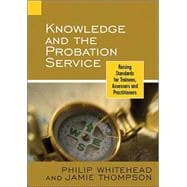
Note: Supplemental materials are not guaranteed with Rental or Used book purchases.
Purchase Benefits
What is included with this book?
| About the authors | |
| Preface | |
| Acknowledgements | |
| Training and knowledge in probation: A historical overview | |
| Introduction | |
| Emergence of probation | |
| Training in the early years | |
| The need for training gathers pace | |
| The first Home Office Training Scheme | |
| Casework in probation | |
| The 1940s and beyond | |
| The implications of empirical research | |
| Towards the present | |
| From generic to specialised training in the 1990s | |
| Conclusion | |
| Summary | |
| Further reading | |
| Knowledge in vocational education | |
| Towards an understanding of change | |
| Knowledge and competence | |
| The knowledge economy | |
| Theory and practice: Knowledge for work | |
| From codification to learning | |
| Feelings: Last but not least | |
| Summary | |
| Further reading | |
| The Diploma in Probation Studies | |
| Introduction | |
| Occupational Standards | |
| NVQs | |
| PDAs | |
| Assessment and knowledge | |
| Analysing the knowledge requirements | |
| Summary | |
| Further reading | |
| Knowledge resources for trainees: Help with the NVQ | |
| Introduction | |
| Victims | |
| Explaining offending behaviour: The search for patterns | |
| The probation service and legislation 1861-2001 | |
| Local area policies and guidelines | |
| Professional values | |
| Risk assessment | |
| Effective practice/methods of working | |
| Communication | |
| Enforcement and compliance | |
| Self-reflection and personal development | |
| Confidentiality | |
| Conclusion | |
| Summary | |
| Knowledge resources for trainees: Writing quality Pre-Sentence Reports | |
| Introduction | |
| Rationale | |
| Defining quality | |
| Process | |
| Content of PSRs | |
| Key features in report writing | |
| Reports and race | |
| The sentencing framework | |
| Implications for reports: Points to emphasise | |
| Nil reports | |
| Conclusion | |
| Summary of available sentences | |
| Additional requirements | |
| Strategy for learning how to write reports | |
| Summary | |
| Further reading | |
| The Practice Development Assessor: Producing quality probation officers | |
| Introduction | |
| The role of the PDA | |
| NVQ Assessor | |
| Internal Verifier | |
| Three PDA models | |
| Reflections on the role | |
| Knowledge as a multifaceted concept | |
| Knowledge typology for probation practice | |
| Elements of a training strategy | |
| Conclusion: Further reflections on the NVQ | |
| Summary | |
| Further reading | |
| Being a probation officer | |
| Introduction | |
| Continuing professional development | |
| Learning in practice | |
| Emotional development | |
| Personal values | |
| Probation values | |
| Being a probation officer | |
| Summary | |
| Further reading | |
| From competence to excellence: Going beyond the codification of knowledge | |
| Summary of Chapters 1-7 | |
| Going beyond minimum knowledge requirements | |
| Threats to knowledge | |
| The PDA-TPO dynamic | |
| Suggestions for further improvements | |
| Final comments | |
| Summary | |
| Appendices | |
| Influences that have shaped five key phases of probation history | |
| Criminological perspectives: Help for practitioners | |
| Client or offender: The labelling perspective | |
| Joining loose wires to make connections: Developing practice awareness | |
| Methods of working with offenders | |
| Differentiating the 'what' from the 'how' of practice | |
| Glossary | |
| References | |
| Index | |
| Table of Contents provided by Publisher. All Rights Reserved. |
The New copy of this book will include any supplemental materials advertised. Please check the title of the book to determine if it should include any access cards, study guides, lab manuals, CDs, etc.
The Used, Rental and eBook copies of this book are not guaranteed to include any supplemental materials. Typically, only the book itself is included. This is true even if the title states it includes any access cards, study guides, lab manuals, CDs, etc.